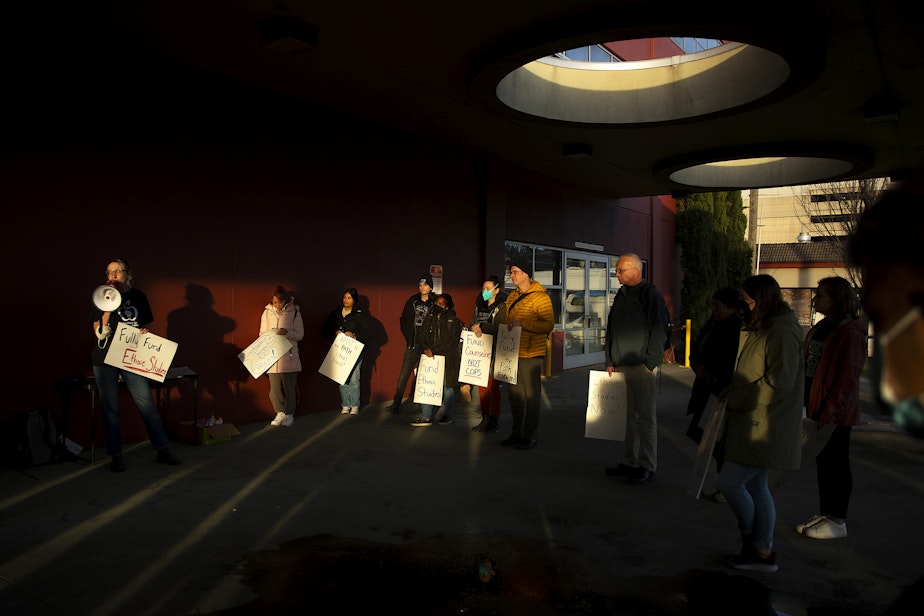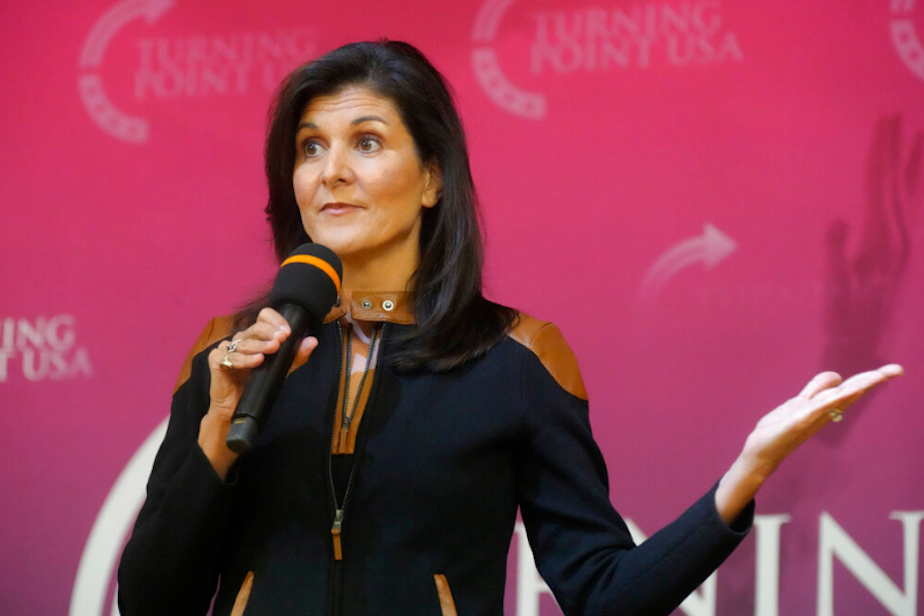A public safety state of mind: Today So Far

- Is Seattle safe? Is public safety a state of mind?
- Idaho lawmakers want to open up dialogue with their counterparts in Oregon to discuss the issue of redrawing state borders.
This post originally appeared in KUOW's Today So Far newsletter for February 13, 2023.
Is Seattle safe?
I have friends and family from outside the city who won't step foot in Seattle, despite my anecdotal accounts to counter their negative anecdotal accounts. The Seattle Police Department's annual crime report for 2022 is not going to help this perspective. It basically states that, aside from a dip in rates during the fourth quarter of the year, crime is up overall in Seattle. It's worth noting that crime is up across the region, not just in Seattle.
In today's episode of Seattle Now, Seattle University professor Dr. Jackie Helfgott says there is a factor that goes beyond the stats that not everybody considers — perception.
"If people are afraid of crime in their neighborhood, they are going to be less likely to go outside, they are going to be less likely to engage with their neighbors, and a big part of reducing crime involves knowing your neighbors, getting outside," Helfgott said. "People have discussed, 'We need more people downtown.' Crime has increased for downtown businesses because during Covid there weren't as many people downtown. So if people are afraid to go outside, there's not going to be as many people walking around, and that is going to increase certain types of crime."
"If you have people out walking their dogs, out and about, riding their bikes and feeling safe, yes, you are going to reduce the likelihood of crime occurring in those areas."
Sponsored
It's sort of like a crime and safety version of the chicken or the egg dilemma. Or as Rob Gordon would say: "Did I listen to pop music because I was miserable? Or was I miserable because I listened to pop music?"
Dr. Helfgott adds that relative to other major cities like LA, New York, or Chicago, Seattle is relatively safe. She argues that feeling safe and perceptions of crime are more important than crime rates. As a coldhearted Taurus who leans more into facts and logic than feelings, I don't think I'm going to see eye-to-eye with the professor on this one, however, she does have a certain, valid point here.
Feelings of safety and perceptions of crime can play an important role in getting people involved. Seattle University does its own annual assessment of crime perceptions in the city, and hosts a lot of community discussions on the issue. Helfgott notes that Seattleites often state reasons why they don't call 911: They don't want to waste resources; They doubt police will come; They associate police with systemic racism. Plus, folks often want a response other than police for their 911 call. But Helfgott counters that they still need to call 911, for a variety of reasons. Even if they feel police will not respond, the call will still create a data point that officials will use deploying resources in the future. Also, 911 calls don't just go to police, they go to emergency services. Big picture, the professor says that Seattle residents need to take their feelings about public safety and use them as motivation to get involved.
"Informal social control — become involved in helping and working with the Seattle police, working with community agencies, working in the city to help increase capacity for public safety," Helfgott said. "We've all heard a lot of talk about, 'We don't want the police doing it, we can't have the police doing it alone.' So every single person who lives and works in Seattle can play a role in increasing public safety."
Check out Seattle Now's episode here.
Sponsored
The effort to create "Greater Idaho" has been a few years in the making. Now, Idaho lawmakers want to open up dialogue with their counterparts in Oregon to discuss the issue.
There have been a few different motivations behind efforts to get Idaho to annex parts of Eastern Oregon. The core argument, currently, is that the eastern side of the state is more culturally aligned with Idaho than the rest of Oregon — in other words, they're more conservative and don't like being associated with those hippies in Portland. Lawmakers in Boise are pushing a bill that would allow Idaho lawmakers to talk with Oregon lawmakers about this idea. In order for this to happen, Idaho's Republican Legislature and Oregon's Legislature (which leans slightly Democrat) would have to agree, and then Congress would have to approve.
You'll find a few different maps of "Greater Idaho" that have been proposed over the years. Some incorporate parts of Eastern Washington, parts of the southern Oregon coast, even Nevada. The most recent map is less ambitious and proposes to move the Idaho-Oregon border to just east of the Cascade Mountains — aside from Bend, Ore., probably, again, because of hippies.
The current map of the new borders would make the shape of Idaho roughly appear like a giant middle finger shooting up in the center of the Northwest. I'm not making any judgements. The teenage punk version of myself really likes the idea of a state shaped like someone flipping the bird. Still, it doesn't really convey they whole "conservative" vibe they're aiming for.
Read more here.
Sponsored
AS SEEN ON KUOW

DID YOU KNOW?: All the efforts to redraw Northwest borders
The idea of moving the borders around Idaho is not new and various groups, with differing motivations, have aimed at doing so for many years.
Sponsored
One movement is called the American Redoubt and is popular among the survivalist and prepper crowd. A "redoubt" refers to a defensive structure built around military forts. The idea here is for Christians and conservatives to move to states like Idaho, Montana, Wyoming, and parts of Washington and Oregon, to create a culturally distinct region with political power.
While proponents of the American Redoubt movement claim to be anti-racist, it's worth noting that the exact same borders have been pursued by white supremacist groups in the past, who have also sought to migrate like-minded people to the region. When talking with Spokane Sheriff Ozzie Knezovich a few years back, he told me groups spanning sovereign citizens to Christian Identity have endeavored to create "their own nation. It goes back to the old Christian Identity movement of a white homeland, comprising of Idaho, Montana, Wyoming, Oregon, Washington — and about 15 to 20 years ago they added Alaska to that.”
It's also worth noting that former state Rep. Matt Shea — who was accused of domestic terrorism and authoring a disturbing manifesto about Biblical reasons for war — pushed for a new state to be created out of Eastern Washington, called Liberty. Shea's arguments were similar to that of Greater Idaho's rhetoric. He said Eastern Washington was culturally distinct from Western Washington and should not be associated with the “socialist values of downtown Seattle.”
Local historian Feliks Banel has pointed out that Washington has a long history of people wanting to secede this part or that part, or wanting to mess with the borders. There was an effort to create the territory of Walla Walla in the 1860s. There also was a movement to create the territory of Idaho, which actually did happen and Washington lost that portion of its territory. There was also a desire to include what is today the Idaho panhandle in Washington when it became a state, but that did not go anywhere.
Eastern Washingtonians wanted to secede from the state in 1896. There was also an effort to create the state of Lincoln out of portions of Washington, Idaho, and northeastern Oregon in 1907. A second attempt at a state of Lincoln, comprised of Eastern Washington and the Idaho panhandle was made in 1913, and a third attempt in 1915. There were also proposals of creating the state of King, out of King County, as well as the state of Roosevelt out of the eastside of Washington. Disagreements over fishing laws on the Columbia River led to an idea of allowing Oregon to annex southwest Washington in 1939. And as Banel notes, Republican lawmakers have attempted to create a new state out of Eastern Washington in 1985, 1991, 2001, 2005, 2015, 2017, and 2019.
Sponsored
ALSO ON OUR MINDS

Haley signals a new direction for the GOP's national ticket
Republican women are poised to play a larger role than ever in the process that chooses their party's national ticket for 2024. The most immediate symbol of this is Nikki Haley, the former U.S. Ambassador to the United Nations, who is expected to announce her candidacy for president on Wednesday.

